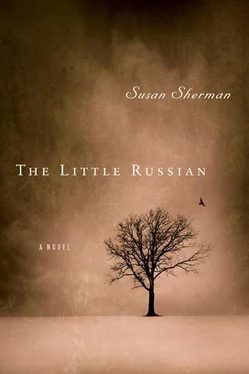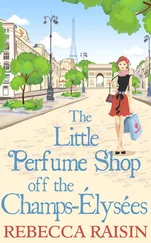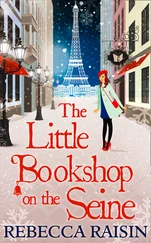It was lonely in Mosny. There was nobody to talk to. They were all so irritating in their fanatic adherence to Jewish law and custom, so stubborn and unchanging, without the least appreciation or understanding of culture. No one spoke Russian. They only read Yiddish newspapers and penny dreadfuls. They all dressed badly and bathed infrequently—this being particularly noticeable on hot summer days. No one had ever heard of Balzac, Stendhal, or Goethe or read poetry or listened to a symphony or even a piano sonata.
On some days she would only speak French, even though no one else in town could. On other days she wouldn’t speak at all and addressed everybody with a sullen look of disapproval. She often wore her Muscovite silks for no reason, looking especially out of place among the plain head scarves and dusty black skirts. But her worst crime, the one that had won her the enmity of nearly the entire population, was sitting out in the town square under a horse chestnut tree reading a book on Saturday afternoons.
Saturdays were always reserved for the parade of marriageable girls and boys around the town square. There were the girls in their muslin dresses walking arm in arm and the boys standing on the sideline in groups of twos and threes, watching the show and whispering to one another. It was a subtle performance involving ancient social cues: a flick of the eyes past a freshly scrubbed face, a nervous giggle and lingering look from beneath the brim of a straw sailor hat. Because the girls had to look their best, money that had been laid aside for necessities or emergencies was now freely spent on yard goods, gloves, hats, and spools of machine-made lace. It was an investment in the future and as necessary to a good match as a walk around the square, a veiled exchange of glances, and a visit from the matchmaker. It was how courtship was done in Mosny, how it had always been done, that is, until Berta Lorkis came home. Now the boys only wanted to look at her.
Had Berta known the trouble she was causing, she would have picked another bench. She wasn’t interested in these boys. Half of them were yeshiva bocherim , students from the Talmudic academy in Bogitslav. The rest were apprentices to tradesmen or journeymen. What would she do with a boy like that, especially since they were all younger than she and beneath her in every way?
The people of Mosny didn’t know how she felt. They thought she was having fun with them, torturing them by flirting with their boys. The mothers of the girls were incensed, as were the marriage brokers, the tailors, the dressmakers, and anyone else who made a ruble or two off the marriage trade. They all wanted her gone from her bench under the tree. But nobody said anything, so she continued to sit there week after week, unwittingly laying waste to the dreams of mothers and dressmakers.
On this particular hot summer day the store was crowded with muzhiki, peasants who had come in for market day with their carts full of produce. They had lined them up in the town square, fruit here, vegetables there, dairy on one side, honey on the other, and the perimeter filled with livestock. The women left their daughters in charge of the stalls while they came into the grocery to buy staples. Jewish housewives tramped up and down the square, clutching the sweaty arm of a child, fingering the last kopeck, looking for the best potatoes, the firmest beets at the best price. Each side used bits and pieces of the other’s language, a price quoted, a counter offer, a sour look of mistrust. Nobody wanted to be cheated. Here there was a tenuous connection between town and country, Jew and gentile, a slender branch built on commerce. But it was also September 1904, exactly one year and five months after the bloody pogrom at Kishinev where forty-nine Jews were killed and more than five hundred injured. So it was no wonder that the Jews were holding their breath, waiting for the branch to snap.
Berta stayed in the grocery that day, waiting on customers, trying to keep her mind far away from Moscow. But there was always something to trigger the memories, a word, a phrase, or a picture of a sled on a can of chestnuts, and she’d be back riding in an open sleigh down Petrovka Street. It was just before dawn and she was bundled up in furs and leather blankets, coming home from a party at the Kokorevs’. Standing there in one of the aisles of the market she could just about smell the signal bonfires at the intersections and hear the sleigh bells and the whoosh of the runners on the hard-packed track. She remembered the way icicles bearded the birdbaths on Leontievsky Street and how it felt to look up to the sky, close her eyes, and let the snow fall on her face, icy and wet, thudding down on her cheeks and lips with the softness of goose down.
“Berta!”
“What?” she asked in annoyance, wrenched from her daydream.
“I am talking to you.”
“I know, Mameh. I can hear you. I’m not deaf.”
“But you weren’t listening. You get that faraway look on your face and a whole mountain could fall on your head.”
“What is it?”
“I want you should go over and watch that woman by the ribbons. I think she’s about to steal something.” Mameh had been born into the grocery business and had a second sight for thieves. At one time her family owned two shops in Mosny, but had to sell the hardware store to pay the bribes that were necessary to keep her brother out of the army. In those days, there was a quota that had to be filled for each townlet. Every year so many Jewish boys were chosen for a twenty-five-year stint in the military. Fortunately, deferments were easy to come by for the right price, but they were expensive. For a time her parents considered dressing their son as a girl for six years and saving the store. But he was skinny and had a prominent Adam’s apple, and they were afraid of getting caught. So they sold the hardware store, paid the bribes, and kept the grocery. Eventually Mameh’s brother went to the yeshiva and became a popular rabbi though an indifferent scholar. When her parents grew too old to mind the store they gave it to Mameh and Tateh.
Berta spotted the woman her mother was pointing out and had to admit she did look suspicious. She kept fingering the lace and glancing up at the counter where they were standing. So Berta kept an eye on her while edging past the customers and as a result she nearly collided with a young man who was just coming in the door. Their near collision startled her and she swore in French, calling him an imbecile.
“ Je suis si désolé, mademoiselle. J’ai été tout à fait un idiot et prie votre remission ,” he replied hastily, giving her a little bow.
A prick of surprise. She had never heard a word of French spoken in Mosny that she didn’t utter herself. In one sweep she took him in. He was Jewish, though not devout, because his hair was cut short and he was clean-shaven except for a dark moustache. He was young, younger than she. His eyes were small like a Tartar ’s but intelligent. His clothes were shabby; his vest and jacket had come from different suits. Maybe he had learned a bit of French along the way, a few words here and there, but it was clear that he was just another inhabitant of the Pale, unschooled except in the Talmud and the Torah, stolid, unchanging, and ultimately uninteresting.
She went back to the thief and stood there until the woman was shamed into leaving the store. Then she returned to the counter and waited on a young mother with a fussy baby in her arms. When his turn came, the young man stepped up and, after giving her a quick smile, glanced behind her to the shelves where the factory-made cigarettes were kept. “You have Kollis?” he asked in Yiddish, requesting the most expensive brand.
She nodded, got a package down, and laid it on the counter. “Ninety kopecks.” It was a ridiculous sum even for readymade cigarettes. She half expected him to walk out. Without hesitation he reached into his pocket, picked out the coins, and gave them to her. Then he picked up his cigarettes, thanked her in French, and left the store to the sound of the jingling bell.
Читать дальше












